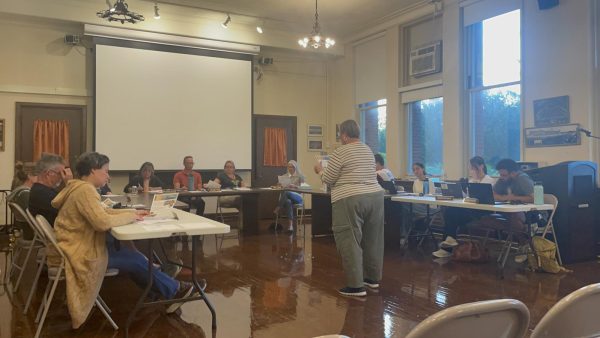Midterms replaced, unit exams come into play
American Literature teachers hold a meeting within their department.
Over the course of previous school years, students have become accustomed to a typical school year. Classes receive numerous lessons, followed by a midterm exam after 10 weeks, more lessons and ultimately a final examination at the end of the semester.
This year, however, a new shift in policy is occurring. After months of planning and consideration, administration has put an end to the customary midterm exams at the end of first and third quarters.
The term “midterm” refers to a comprehensive test containing all material covered at the end of the first or third quarter.
Instead of midterm exams, each department will administer unit exams. These new exams have been dubbed a summative assessment, which is a collaborative effort by the members of each department.
According to Ms. Whittaker, head of the Science department, and Ms. Vale, head of the English department, the exams will be given at the end of each unit and will be the same across the board for all classes pertaining to that subject.
Whittaker and Vale emphasized that this will allow teachers to obtain a better perspective of the student’s overall understanding of the unit, as well as allow students to learn the same information despite the way it is taught.
“At the end of the day, even if I’m teaching differently than another teacher, we’re still giving the same information to our students, and we’re being sure to assess them on what we really want them to know,” Whittaker said.
For teachers and students alike, eliminating midterm exams signals an end of a hallmark tradition in the way Lane classes were previously conducted. In the past, the curriculum was broken down into quarters of time, rather than units of material, Vale said.
“It’s not dictated by the amount of weeks that we’ve taught, instead it’s more or less structured with whatever skills we decided we want to teach and however long it takes us to teach those skills,” Vale said.
While the unit exams are not drastically different from midterm or final exams, they will have noticeable changes.
One prominent component of the new department exams will be the integration of Common Core standards and AP-aligned skills.
“We have to teach using the common core state standards, so that’s one thing that helps make our units cohesive — everyone teaches the same skills,” Vale said. “But another thing is that we are all aligning to Advanced Placement standards as well, so our goal is to prepare students for college one day; even at the youngest grade level, we’re still trying to prepare students for one day being able to be successful in a college class.”
Whittaker said that the unit exams for the science department will be entirely composed of free response questions, a stark contrast to the multiple-choice based finals and previous midterms.
“We really want to understand what our students know and what we still need to help them learn, which is a better way of doing things than just multiple choice,” Whittaker said. “With multiple choice, you can guess if you weren’t prepared, and we give you the answers — so it’s more identifying and not necessarily knowing.”
According to Vale, the immediacy of the unit exams will essentially allow teachers to tailor lessons based on what their students know, which will in turn allow students to be more prepared for the final exam.
“So if the quarter contains ten weeks but we teach two different units within it, then right away at the end of the unit we know where our students are and we know whether or not we can move on to the next unit,” Vale said.
As with any new change, controversy about the exams surrounds the school community.
“The fact that unit exams are more frequent causes more stress on students,” Katie Stamatis, Div. 956, said. “A midterm is just a one time thing, but the new exams come with a mental exhaustion at the end of every unit.”
Demetri Maglaras, Div. 964, offered a contrasting opinion about the frequency of unit exams. “I feel a lot less stress on myself and my grade for a particular class because it doesn’t have as big of an effect on my grade, like midterms used to have,” Maglaras said.
Nevertheless, Whittaker said that the new exams will allow teachers to obtain a more accurate grasp of the students’ knowledge.
“I think it’s a lot better than the way things were done prior,” Whittaker said. “Even though it takes a long time to grade, we can see and understand what our students know in a much more obvious way.”
Your donations directly fund the Lane Tech student journalism program—covering essential costs like website hosting and technology not supported by our school or district. Your generosity empowers our student reporters to investigate, write, and publish impactful stories that matter to our school community.
This website is more than a publishing platform—it's an archive, a research tool, and a source of truth. Every dollar helps us preserve and grow this resource so future students can learn from and build on the work being done today.
Thank you for supporting the next generation of journalists at Lane Tech College Prep!

Nicole is a senior this year and is one of the Warrior’s chief editors. She has been involved with the Warrior since her junior year and is passionate...

Roman Treuthart is a junior at Lane and this is his first year taking any type of journalism class. Outside of class, he has been taking photos passionately...





